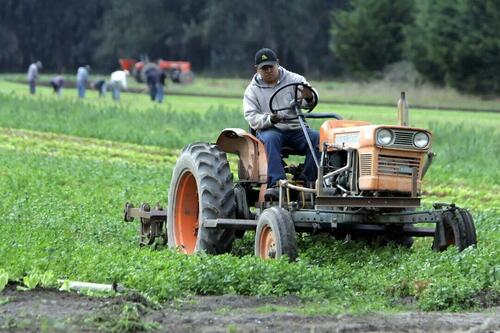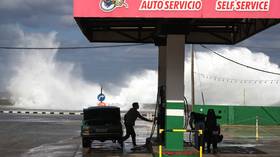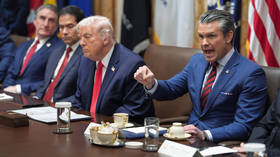
Make It Make Sense: Why Are We Punishing The Farmers Doing The Right Thing?
Authored by Mollie Engelhart via The Epoch Times,
Why is it that the organic apple must wear a label, pay a certification fee, and carry a price premium—while the conventional apple, grown with chemical fertilizers and synthetic pesticides, is simply called an apple?
What if we flipped that?
What if the organic apple was just an apple—and the one grown with chemical inputs had to be labeled chemically grown? Why does the burden fall on the farmer doing the right thing, while the one using harmful practices skates by without warning, cost, or consequence?

Why does the farmer who’s working with nature—protecting our water, preserving our soil, and nourishing our communities—have to pay extra, while the farmer who’s polluting gets to do so for free? Why is the financial burden on the one not doing the damage?
Our rules make it harder to farm responsibly. A chemical farmer can spray right up to the edge of their fence line, but an organic farmer must give up 25 feet on all sides—and sell that buffer zone as non-organic. How does that make any sense?
We claim to want cleaner food, cleaner water, and a healthier planet. But the regulations say otherwise. They punish the farmer doing what’s best for humanity and reward the one taking shortcuts that come with long-term consequences.
Meanwhile, foreign-owned corporations—some with deeply troubling records abroad—are seeking permission to be traded on U.S. stock exchanges. Others continue selling toxic chemical products in the U.S. that are banned in their own countries. Why are we opening our doors to this? Why do we reward bad actors while the honest, hardworking American farmer drowns in red tape?
The system is rigged. It pushes farmers toward chemical dependency—not because they want to—but because doing the right thing is cost-prohibitive and over-regulated. Organic farmers pay annual fees and a percentage of their sales just to carry the label. They’re taxed not just financially, but logistically and emotionally—while conventional farmers get a free pass to pollute.
Imagine if we flipped it. What if the farmer spraying chemicals paid for that privilege? What if the cost and the burden were placed where the actual harm occurs? Wouldn’t that make more sense—for humans, animals, pollinators, soil, and future generations?
Consider this: research has shown that living within a mile of a golf course significantly increases your risk of Parkinson’s. Why? Because of a widely used herbicide that’s banned in other countries, yet still sold here—often by foreign companies that won’t allow its use in their own homeland. Why do we allow that without tax, penalty, or even a warning label?
Even within the regenerative and organic movements, we’re adding roadblocks. Equity audits have been folded into some certification programs. While I believe all men are created equal in the image of God, blending social justice metrics into a farming standard makes the transition away from chemical farming even less accessible to the very farmers we’re trying to reach. If we want to include social goals, let’s create a separate certification for those values. But let farming standards focus on soil, animals, and food.
On my farm, as on many others, men and women often do different jobs. Pay parity audits don’t reflect that nuance. Racial equity standards can also become murky when most of the labor force is a different ethnicity than the family that owns the farm. I used to joke, “I’m the only white person here—and I’m the one paying to keep this place going. I don’t even get paid—so is that equity?”
And here’s the bigger question: why are we trusting distant bureaucracies to keep our food safe instead of trusting our neighbors and fellow American farmers?
We’ve been conditioned to believe that federal regulation protects us, but often, it protects itself. Bureaucracy and red tape don’t make food healthier—they make it harder and more expensive to grow. They widen the gap between citizens and their food, and between intention and impact.
We are so far removed from functioning as a constitutional republic that many Americans don’t even remember that’s what we are. But it’s time we return to that foundation—where power is decentralized, communities are strong, and individuals take responsibility for what they grow, eat, and support.
We need less regulation and more relationship. We need to know who’s growing our food. We need to support local systems—small farms, medium farms, and large local farms that feed their communities. We need to rebuild a robust hub-and-spoke food network that serves people, not just centralized corporations.
Why is raw milk illegal in many states, while shelf-stable, ultra-processed food-like substances—linked to chronic disease—are perfectly legal? We’re afraid of the wrong bogeyman. We’re being lulled to sleep by the illusion of convenience, but there are real consequences: to our health, our water, our soil, and the survival of the American family farm.
If we want a food system that supports health, freedom, and regeneration, we must stop rewarding the polluters and punishing the protectors.
Views expressed in this article are opinions of the author and do not necessarily reflect the views of The Epoch Times or ZerHedge.
Tyler Durden
Sun, 06/08/2025 – 15:10


















